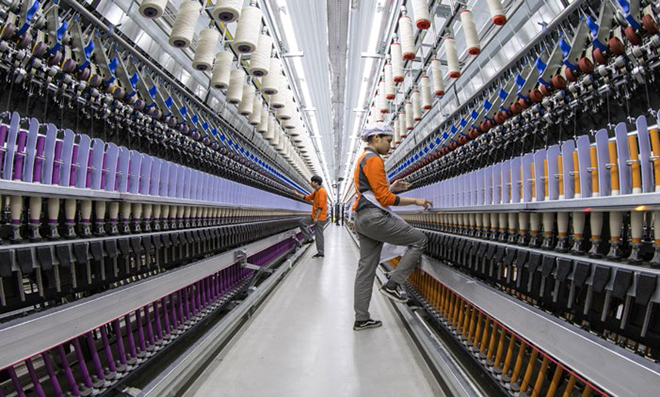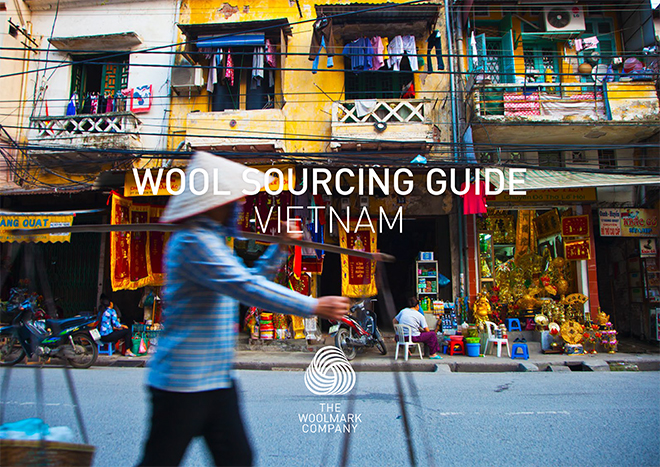Interest in wool textiles from Vietnam grows

Since AWI identified Vietnam more than a decade ago as a key emerging market for wool, Vietnam has grown into an important manufacturing hub for wool textiles, with brands from across the world showing strong interest in sourcing textiles from the country.
Since AWI identified Vietnam more than a decade ago as a key emerging market for wool, Vietnam has grown into an important manufacturing hub for wool textiles, with brands from across the world showing strong interest in sourcing textiles from the country.
The Vietnam textile industry is the third largest apparel exporter in the world accounting for 6.3% of world apparel exports in 2019. AWI first identified Vietnam as an emerging manufacturing hub for wool textiles in 2012 when the Vietnam textile industry begun to focus on moving toward high-quality products and production.
Since then, AWI has worked closely with partners throughout the supply chain. AWI has transferred technical knowhow about the manufacturing of wool products, disseminated information about sources of raw materials and machines, and organised international trade missions to connect project partners with buyers.
AWI currently collaborates with more than 90 partners including flatbed knitters, circular knitters and garment making companies. In recent years, AWI has also worked with Vietnamese domestic brands to produce their first wool collections which have successfully sold in the domestic market.
Vietnam is no longer an emerging market. The country now boasts a robust wool supply chain including spinning, weaving, knitting and whole garment manufacturing. This vertical integration means designers, brands and buyers can source all their garment requirements from the one country, cutting out logistical times and dealing with many suppliers.
As the country’s economic and social environment has evolved, AWI has witnessed Vietnam’s growing use of Australian wool to produce quality garments.
“AWI’s program has successfully helped future-proof Australian wool’s prospects by opening up a new and expanding processing destination for Australian wool. Our heritage in wool research and development together with Vietnam’s solid background in the textile industry made a perfect combination,” said AWI Regional Development Manager, Trudie Friedrich.
“AWI’s success in Vietnam can be attributed to a number of key factors including a rapidly growing economy, a rich textile culture, a competitive workforce, and a desire by brands across the world to diversify their supply chain away from China for reasons such as trade disputes and increasing costs of production there.”
Vietnam Supplier Presentation webinar for Japan
With a trend for the sourcing teams of brands in Japan to look at moving their production out of China, the AWI office in Japan organised a webinar in October in which six suppliers in Vietnam presented information about their businesses to Japanese trading houses, brands and suppliers.
There were 36 attendees from 22 companies including Itochu, Nippon Steel, Marubeni Fashion Link, SanMarino, Takisada, Takihyo, Asics and Wacoal.
The objective of the online seminar was to increase awareness in Japan about Vietnam suppliers, connect Vietnam suppliers with key Japanese companies and generate new wool business leads. Following the webinar, AWI in Japan and Vietnam will support business development.
“Most Japanese apparel brands rely on Japanese trading houses for overseas production,” explained AWI Japan Country Manager, Samuel Cockedey.
“With an increase in production costs in China, trading houses are searching for the next China and are actively investing in creating new supply chains in Vietnam.
“By promoting wool suppliers in Vietnam, we expect more wool business and consumption of wool. Moreover, those suppliers who work with global sports brands should look attractive, especially to Japanese sports and outdoor brands because activewear markets are booming in Japan.”
The Vietnam suppliers presenting were Dalat Worsted Spinning, TOPMODE, YOUNGONE Designer Textiles International, ASIATEX, LPTEX and HOANG DUONG. Panelists also included Trudie Friedrich; Samuel Cockedey; AWI Japan Product, Education Extension & Trade Licensing Manager, Tomohiro Nishizawa; and AWI consultant in Vietnam, Hung Nguyen.
Vietnam Sourcing Guide

To help connect brands to Vietnamese suppliers, AWI also has a 28-page Vietnam Sourcing Guide that shines a spotlight on the expertise and diversity of the wool supply chain in Vietnam. The guide has been one of the most downloaded documents on Woolmark.com.
It has recently been updated and features about 50 spinners, knitters, weavers as well as makers of garments, accessories and socks.












